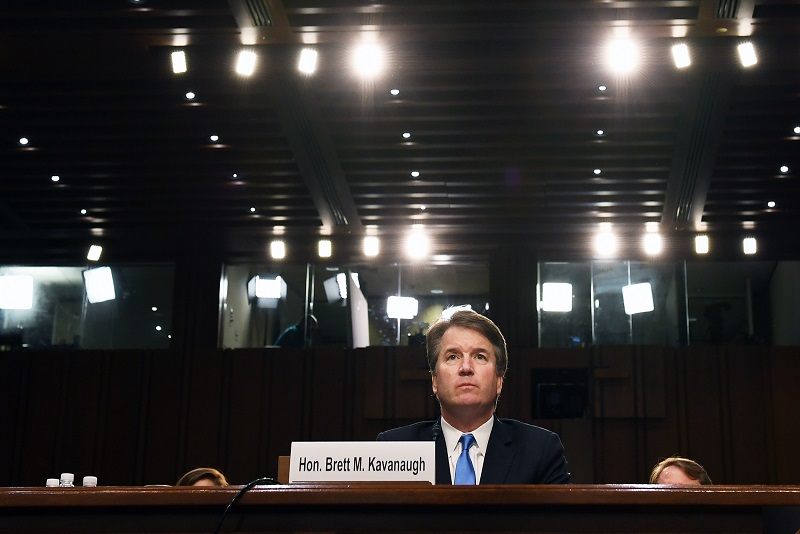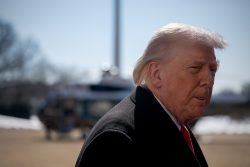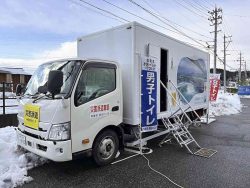
Supreme Court nominee Brett Kavanaugh appears during a confirmation hearing on Sept.
13:50 JST, May 8, 2022
WASHINGTON – A leaked draft opinion from the Supreme Court on abortion rights revealed a new truth about the confirmation fights over these lifetime appointments.
The public hearings, with the nominee testifying usually over three days, have become overly rehearsed matters that mostly provide moments for the senators to appeal to political activists. Instead, the most critical moments for prospective justices often come in the dozens of private huddles they hold with senators.
The routine has become standard: The nominee will be surrounded by a team of White House aides ushering him or her around the Capitol for meetings with key senators. These meetings are not technically one-on-one, as a few aides each for the senator and White House are present, but the talking is almost exclusively left to two people. The rest take notes.
Those meetings, usually lasting at least an hour, provide the basis for most of the questions that senators on the Judiciary Committee will ask at the public hearings, but many senators view these initial comments as more revealing.
“A one-on-one meeting, or a meeting that is not in the klieg lights of the confirmation process, is your best chance to get a real feeling for somebody,” said Sen. Christopher Coons, D-Del., who just finished up his fourth Supreme Court nomination with last month’s confirmation of Justice-designate Ketanji Brown Jackson.
Even Judiciary Committee members realize that there are only a handful or so of genuine swing votes for most nominations to the high court, and none of those undecided senators sit on the committee – which makes their meetings with the nominee so pivotal.
“For the senators not on Judiciary, who are not going to be spending three days listening to that nominee, it is probably more important and more revealing,” said Sen. Richard Blumenthal, D-Conn., a committee member who also has gone through four Supreme Court confirmations.
These meetings came back into focus with Politico’s Monday night report of the draft majority opinion that, if it holds up, would overturn the 1973 Roe v. Wade decision providing abortion rights. Supporters for the draft included Justices Neil Gorsuch and Brett Kavanaugh, which key senators say would not be consistent with statements they made during the confirmation process.
“It would be completely inconsistent with what Justice Gorsuch and Justice Kavanaugh said in their hearings and in our meetings in my office,” Sen. Susan Collins, R-Maine, said in a statement issued early Tuesday.
“It’s rocked my confidence in the court. And that is because I think there was representations made with regards to precedent and settled precedent. That comments were made to me and to others about Roe being settled,” Sen. Lisa Murkowski, R-Alaska, told reporters Tuesday.
Collins provided what is considered the difference-making vote for Kavanaugh, while Murkowski opposed his nomination based on his intemperate behavior toward senators at follow-up hearings to consider sexual assault allegations against him dating to when he was in high school. Kavanaugh has denied the accusations.
Both moderate Republicans, who are generally supportive of abortion rights, gave floor speeches before the Kavanaugh vote saying he reassured them privately he would not vote to overturn the Roe decision. In spring 2017, before voting to confirm Gorsuch, Collins said she specifically asked him “if five current justices” could overturn “a long-established precedent” if they considered it wrong.
“Emphatically no,” Gorsuch responded, according to Collins’s recollection of the private meeting.
Now, five current justices appear poised to overturn a 49-year precedent, which was upheld again in 1992, leaving some senators and aides combing through their notes of those meetings with recently confirmed justices.
By the time Supreme Court nominees reach their public hearings, they will have spent days undergoing “murder board” sessions in which dozens of White House aides ask them tough questions and prep them to answer without causing any controversy.
That’s why those early meetings with one senator at a time can be make or break.
In 2005 one Supreme Court aspirant practically lit her nomination on fire during a meeting with Arlen Specter of Pennsylvania, then the Republican chairman of the Judiciary Committee.
Specter walked out of meeting with Harriet Miers, who had little training in constitutional law and no paper trail on hot-button issues, and told reporters that she saw the Griswold v. Connecticut case as “rightly decided.” Conservatives revolted because that 1965 ruling provided a right to privacy and became the foundation for Roe and other reproductive rights cases.
The nominee called the chairman to complain that he had misrepresented her views. That went over terribly. Specter, a moderate, spent the next week publicly criticizing Miers and she soon withdrew from consideration.
Blumenthal had a high-profile moment with Gorsuch in February 2017, asking the nominee if he thought it was terrible how then-President Donald Trump liked to publicly criticize judges.
“He said, in effect, yes, and I went out and I said what he told me,” Blumenthal recalled. Gorsuch’s White House handlers confirmed the remarks, but it was later revealed that Trump blew up upon learning his own nominee criticized him.
Coons said he usually begins each session with the “get to know you stuff” about the nominees’ personal background, before trying to focus on four or five legal topics.
He will eventually drill down on one key topic and tell the nominee that will be “the hardest question” he asks during the public hearings.
“Kavanuagh was probably the most intellectually agile and engaged. Meaning, we got into a really thorough, very rapid back and forth about unitary executive theory and about his writings on that,” Coons said of his private discussion over the justice’s views on executive power.
These meetings are never recorded, but Coons, as other senators and staff said, keeps very detailed notes.
Collins relishes her reputation as being meticulous with the nominees behind closed doors. For weeks during the Kavanaugh confirmation, she carried around a massive binder of his writings, reminding reporters that she had consulted 19 lawyers about his record. She sat down with him for more than two hours and then had a follow-up call that lasted more than an hour.
In her 2018 speech announcing her support, Collins went into great detail about how Kavanaugh told her Griswold was “settled law” and that the 1992 abortion ruling provided Roe the elevated stature of “precedent on precedent.”
She asked Kavanaugh almost the exact same question that she presented to Gorsuch. “When I asked him would it be sufficient to overturn a long-established precedent if five current justices believed it was wrongly decided, he said emphatically no,” Collins said in October 2018.
Murkowski declined in recent days to recount the details of her discussion, but she told reporters that she covered similar ground with Kavanaugh and other nominees.
“Did I have conversations about how he defines what is settled, what is precedent? Yeah,” Murkowski said. “I do that with every judge that I’ve had the opportunity to sit with.”
Despite their outrage over the draft ruling, neither Collins nor Murkowski has indicated what they will do if the final ruling looks similar. Will they release transcripts of their private meetings? Will they call for hearings about these private talks?
Blumenthal, for one, still finds value in these private meetings, more than the overly rehearsed public hearings.
“Anyone who’s sitting at a lectern, in front of the Judiciary Committee, is going to be more buttoned up,” he said.
Top Articles in News Services
-

Prudential Life Expected to Face Inspection over Fraud
-

Hong Kong Ex-Publisher Jimmy Lai’s Sentence Raises International Outcry as China Defends It
-

Japan’s Nikkei Stock Average Touches 58,000 as Yen, Jgbs Rally on Election Fallout (UPDATE 1)
-

Trump Names Former Federal Reserve Governor Warsh as the Next Fed Chair, Replacing Powell
-

Suzuki Overtakes Nissan as Japan’s Third‑Largest Automaker in 2025
JN ACCESS RANKING
-

Japan Institute to Use Domestic Commercial Optical Lattice Clock to Set Japan Standard Time
-

Israeli Ambassador to Japan Speaks about Japan’s Role in the Reconstruction of Gaza
-

Man Infected with Measles May Have Come in Contact with Many People in Tokyo, Went to Store, Restaurant Around When Symptoms Emerged
-

Prudential Life Insurance Plans to Fully Compensate for Damages Caused by Fraudulent Actions Without Waiting for Third-Party Committee Review
-

Woman with Measles Visited Hospital in Tokyo Multiple Times Before Being Diagnosed with Disease























